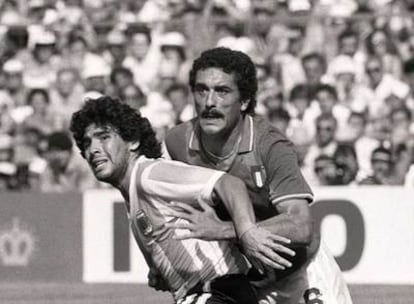How Claudio Gentile owned the 1982 FIFA World Cup (and other stories)
‘Moment of Truth’ is a TV series that reminds us of all the iconic moments of championships past, but nostalgia can be tricky

The image of an elderly Sandro Pertini leaping to his feet in excitement, a passionate Kuwaiti sheikh running down from the stands to protest a referee’s call (and successfully overturning a goal), the venerable El Molinón stadium in Gijón (Spain) reverberating with shouts of “Just kiss already!” to protest the lackluster Germany-Austria match, the many heartbreaks of Spain’s national team, and the lovable Naranjito mascot of the 1982 FIFA World Cup in Spain. Those of us who were teenagers during that World Cup will forever hold it in our hearts. But anticipation for the 2030 World Cup evokes a different feeling. Not because an event spread across three continents and six countries is less appealing, or because 48 teams playing over 100 matches might produce a lower level of play. No, the real reason is that we have changed.
Soccer holds a special place in the collective memory of humanity, often dredging up a profound nostalgia. The British TV series Moment of Truth revives the most legendary tales of past World Cups. While the 10 episodes don’t include as much game footage as one would like, the series compensates by featuring interviews with key figures and eyewitnesses to their incredible feats. The series casts a wide net — Lev Yashin of the USSR, Mané Garrincha of Brazil, Lionel Messi of Argentina, Kylian Mbappé of France, Franz Beckenbauer of Germany, Johan Cruyff of the Netherlands, Zinedine Zidane of France and Spain’s own Andrés Iniesta. It takes a look at lopsided losses by Zaire (0-9) and El Salvador (10-1). It explores ugly moments in World Cup history, like the so-called Battle of Santiago between Chile and Italy in 1962. And it tells the stories of female World Cup stars we would remember if we had watched those games (no, the first one was not in Sydney) with the amazing Marta from Brazil and Chile’s outstanding goalkeeper, Christiane Endler.
The series tends to focus heavily on England, portraying their matches against Argentina as the ultimate rivalry in tournament history. It may be a bit exaggerated to depict David Beckham’s penalty kick goal to avenge an unfair expulsion as a redemption story. But there’s no denying the English team’s defeat by Argentina in the 1986 World Cup in Mexico. In just four minutes, Diego Maradona made history by scoring two goals — one with his hand and another by skillfully dribbling past everyone in his path. We certainly remember that.
The most vivid memory of the 1982 World Cup is Italy’s triumphant underdog story. They persevered through three draws in the group stage. In the second stage, Italy faced tough competition, including Argentina with a young Maradona and a formidable Brazil team featuring Sócrates, Falcao and Zico. Center-back Claudio Gentile effectively smothered Maradona with aggressive tackles that were at times hard to watch on television. Gentile also marked Zico very closely, tearing his shirt, while striker Paolo Rossi continued to score goals that eventually led Italy to the final. Gentile proudly remembered his performance: “Fouling without getting caught is quite clever, you know? It’s easy to just go for a flagrant foul. Let’s just say I was pretty good at it.” Gentile revealed that Maradona tried and failed to provoke him with insults. Both players received yellow cards, one for rough tackles and the other for forcefully protesting the fouls.
Nostalgia can be deceitful. Should we miss that kind of soccer? In today’s game, Gentile would have been sent off and Maradona’s “Hand of God” goal would have been overturned by the video replay we complain about so much. But those misdeeds were forever etched in our young memories, and were also long-lasting lessons for life.
Sign up for our weekly newsletter to get more English-language news coverage from EL PAÍS USA Edition
Tu suscripción se está usando en otro dispositivo
¿Quieres añadir otro usuario a tu suscripción?
Si continúas leyendo en este dispositivo, no se podrá leer en el otro.
FlechaTu suscripción se está usando en otro dispositivo y solo puedes acceder a EL PAÍS desde un dispositivo a la vez.
Si quieres compartir tu cuenta, cambia tu suscripción a la modalidad Premium, así podrás añadir otro usuario. Cada uno accederá con su propia cuenta de email, lo que os permitirá personalizar vuestra experiencia en EL PAÍS.
¿Tienes una suscripción de empresa? Accede aquí para contratar más cuentas.
En el caso de no saber quién está usando tu cuenta, te recomendamos cambiar tu contraseña aquí.
Si decides continuar compartiendo tu cuenta, este mensaje se mostrará en tu dispositivo y en el de la otra persona que está usando tu cuenta de forma indefinida, afectando a tu experiencia de lectura. Puedes consultar aquí los términos y condiciones de la suscripción digital.









































